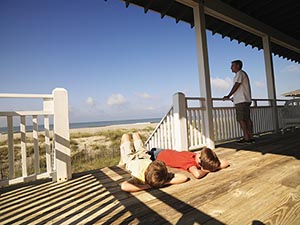The number one rule of summer is protect yourself. You know water for hydration and sunscreen for UV rays, but what you don’t know could burn you before you even leave the house.
 Ragib Hasan, Ph.D., director of the SECuRE and Trustworthy computing Lab (SECRETLab) at the University of Alabama at Birmingham (UAB), says that while online vacation rental scams are growing, there are simple ways to protect oneself.
Ragib Hasan, Ph.D., director of the SECuRE and Trustworthy computing Lab (SECRETLab) at the University of Alabama at Birmingham (UAB), says that while online vacation rental scams are growing, there are simple ways to protect oneself.
“A legitimate website will usually provide you with property information, pictures, the cost of the home and maps,” said Hasan. “The less information a website gives you, the more suspicious you should be.”
Hasan suggested conducting an extensive research up front. Check with the Better Business Bureau if it involves a company, and visit online review sites to see if there are any complaints from past users. Many states provide property databases to verify property owners based on the address. Google Earth allows you to check actual location and look for hidden problems.
Also, look closely at the lessor’s webpage.
| “Never make a hand shake deal, and read the fine print that will define cancellation policies, cleaning fees and damage liability." |
“If they are advertising a one bedroom apartment in New York City, and you see palm trees outside the window in the picture, you know it is a scam,” said Hasan. “Fraudulent sites are very similar to the spam emails you receive; you should be able to find typos and inaccuracies if you look close enough.”
Andreas Rauterkus, Ph.D., an assistant professor of finance at the UAB Collat School of Business who specializes in banking and credit cards, recommends not sending money before you receive, read and sign a contract. He says anybody legitimately renting property – a corporation, private company or personal owner — will use a contract.
“Never make a hand shake deal, and read the fine print that will define cancellation policies, cleaning fees and damage liability,” said Rauterkus.
The contract will also include the deposit amount required, and Rauterkus warns to beware of anyone who asks for a lot of money up front.
“Everybody wants a down payment, of course, but the more they want up front, the more suspicious you should be,” said Rauterkus.
Rauterkus and Hasan each recommended travelers avoid giving a credit card number to anyone you do not know. They suggested only using a credit card on a secure server, and do that by looking for ‘https’ in the web address. The letter ‘s’ at the end of ‘http’ means the website is secure. If there is no ‘s’, there is no guarantee.
“If somebody charges your credit card, and you have authorized the transaction, there is nothing you can do about it,” said Rauterkus. “You may not like the deal anymore, or you may want your money back for whatever reasons, but once you authorize the payment, your money is gone.”
The FBI recommends contacting their local field office if you are the victim of an online rental property scam. You can search for the nearest to you by zip code on their webpage: http://www.fbi.gov/contact-us/field. If it concerns a fraudulent business, the Federal Trade Commission has a site to assist with complaints: https://www.ftccomplaintassistant.gov/.